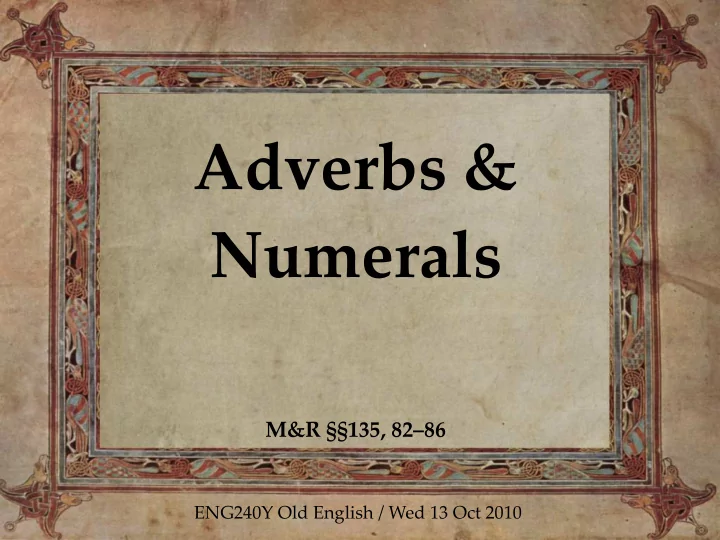

Adverbs & Numerals M&R §§135, 82–86 ENG240Y Old English / Wed 13 Oct 2010
Adverbs ● An adverb is a word modifying a verb, adjective, or other adverb. ● Adverbs divide into: - adverbs of time (now, then, tomorrow, forever) - adverbs of place (here, there, widely) - adverbs of manner (firmly, comfortably, fast, easily) - other adverbs (also, additionally)
Adverb formation in Modern English - easy > easily ● adjective + - ly : - scarce > scarcely - recent > recently - length > lengthwise ● noun + - wise : - clock > clockwise - fast ● unmarked: - hard - yesterday - there - also
Adverb formation in Old English - lang (long) > lange (for a long time) ● adjective + -e : - gearu (ready) > gearwe (readily) - nīwe (new) > nīwe (newly, recently) - īeðe (easy) > ēaðe (easily) - adjective: heard (hard) > heardlīce ● word + - līce : (severely; cf. hearde ) - noun: ār (honour) > ārlīce (honourably) - adverb: ǣr (early) > ǣrlīce (early) ● word + - inga / unga : - adjective: ealle (all) > eallunga (entirely) - noun: ierre (anger) > ierringa (angrily) - oft (often) simple stems: - wel (well) - ēac (also)
Adverb formation in Old English - adjective: efen (equal) > efen (equally) ● word in acc.: - noun: āwiht (anything) > āwiht (at all) - ealle (all) > ealles (entirely) ● adjective in gen.: - nīed (necessity) > nīede (necessarily) ● word in dat. sg.: - hwīl (a while) > hwīlum (sometimes) ● word in dat. pl.: ● with prep.: - tōmiddes (prep. + gen., amidst) - tōgædere (prep. + adv., together) - wiðūtan (prep. + adv., outside) - ymbūtan (prep. + adv., around) - begeondan (prep. + adv., beyond)
Adverb or adjective? ● An adjective typically occurs close to a noun: - immediately preceding a noun: se tila cyning - closely following a noun: Crist nāmode Ābel rihtwisne waldend þone gōdan ● Adverbs will often appear adjacent to the verb or adjective they modify, but esp. with verbs they can move more freely, e.g.: - adjacent to the verb that is modified: hē hearde fēoll - adjacent to subject/object, modifying a clause-final verb: hīe hrædlīce for mægenlēaste swulton
Adverb comparison - gearwe > gearwor > gearwost ● - or , - ost (adj.): - feorr > fierr > firrest ● w/ i -mutation: - nēah > nȳr / nēar > nīehst ● -mest (adv.): - inne > innerra > innemest - sīð > sīðra > sīðemest / sīðest - norð > norðerra > norðmest - wel > bet > betst ● multiroot: - micle > mā > mǣst
Example sentences ● Be þissum ðinge gē habbað oft gehȳred. ● Unriht weaxeð ealles tō wīde. ● Neron cwæþ, “Gang mē nēar hider, and sege mē hwæt þū þence.” ● Iōhannes fulluht ðwōh þone mannan wiðūtan, and nān ðing wiðinnan. ● Ic giestron wæs gēong ācenned. ● Ðes is mīn lēofa sunu þe mē wel līcað. ● Hwīlum Brettas, hwīlum eft Seaxan sige geslōgon.
Numeral declension ● Cardinals: only ān , twēgen , þrīe are typically declined. They decline as strong or weak adjectives, depending on context, but in the plural the difference only shows in nominative and accusative. When ān is weak, it means ‘alone’ rather than ‘one’ - Hīe sind ān god, on ānre godcundnesse and on ānum gecynde. - Hē hæfde twēgene sunu, Ermenrēd and Ercenberht. - Her cōm Port on Brytene and his twēgan sunan. - Nis nā gedafenlīc þæt þes man āna bēo. Ordinals: always decline as weak adjectives, except ōðer , which is always strong - On þām fiftēoþan geare cōm Godes word ofer Iōhannem.
Ordinal formation An ordinal is formed by adding -ta or -ða to the cardinal stem. That stem usually ends in -o , whether by removing the -n of the ‘teen’-morpheme or by adding an o to the ‘ty’- element. Ān , twēgen , þrīe have slightly different ordinals. ān forma, fyrst(a) 1 twēgen æfter(ra), ōðer 2 þrīe þridda 3 fēower fēorða 4 endleofan endlyfta 11 twelf twelfta 12 þrēotīne þrēotēoða 13 þrītig þrītigoða 30
Strong numeral declension Masc Neut Fem Masc Neut Fem Nom ān ān āne twēgen twā twā Acc ānne ān āne twēgen twā twā Gen ānes ānes ānre twēgra twēgra twēgra Dat ānum ānum ānre twǣm twǣm twǣm Inst āne āne Nom þrīe þrēo þrēo ōðer ōðer ōðru Acc þrīe þrēo þrēo ōðerne ōðer ōðru Gen þrēora þrēora þrēora ōðres ōðres ōð(er)re Dat þrim þrim þrim ōðrum ōðrum ōð(er)re Inst ōðre ōðre
Recommend
More recommend